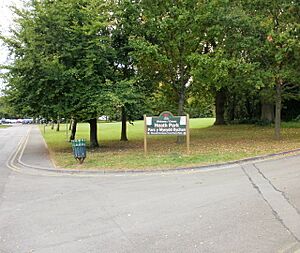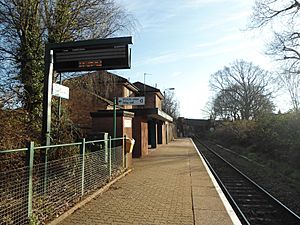Heath, Cardiff facts for kids
Quick facts for kids Heath |
|
|---|---|
| Community | |
 Entrance to Heath Park |
|
| Principal area | |
| Country | Wales |
| Sovereign state | United Kingdom |
| Police | South Wales |
| Fire | South Wales |
| Ambulance | Welsh |
| EU Parliament | Wales |
Heath (which is Y Mynydd Bychan in Welsh) is a lively area in the north of Cardiff, the capital city of Wales. It's known for being a well-off neighbourhood. Houses here are often from the 1930s, with big gardens and tree-lined streets. Heath is also home to Heath Park and the University Hospital of Wales.
In 2011, about 12,629 people lived in Heath.
Contents
What is Heath Like?
Heath was once called the Great Heath. This was because it had a very large park and lots of woodland. Over time, many houses were built, especially from the 1920s to the 1950s. Later, the University Hospital of Wales was built in the 1960s. Because of all this building, much of the original green space is now gone.
You might hear about the Little Heath (Y Waun Ddyfal in Welsh). This is a different area, located south of the Great Heath, near Crwys Road.
Heath Park Fun
Heath Park is a huge green space, covering about 91 acres (37 hectares). It's a great place for outdoor activities. You can find playing fields, tennis courts, and even a miniature steam railway! There are also places to get refreshments.
Birchgrove and Saints Corner
Birchgrove is a busy shopping area within Heath. The houses here are usually more affordable, often terraced homes. It has its own unique feel.
The area around the University Hospital of Wales is sometimes called Saints Corner. This is because many of the streets there are named after famous saints.
Welsh Language in Heath
The number of people in Heath who speak Welsh has grown. In 2001, about 1,378 residents over three years old spoke Welsh. By 2011, this number increased to 1,422.
Even though the number of speakers went up, the percentage of Welsh speakers in Heath slightly dropped. This was mainly because fewer people over 65 spoke Welsh. However, more young people (aged 3-15) and adults (aged 16-64) started speaking Welsh.
Getting Around Heath
Train Travel
Heath has two train stations, making it easy to travel by rail.
- Heath Low Level is on the Coryton Line. This line connects to Cardiff Central and Coryton stations.
- Heath High Level is on the Rhymney Line. This line links to Cardiff Central and Rhymney stations. It also stops at places like Llanishen and Caerphilly.
Bus Services
Many Cardiff Bus routes serve Heath.
- Routes 38 and 39 start from the City Centre and end at the University Hospital of Wales.
- Route 8 travels between the City Centre and Grangetown.
- Route 9/9A goes from the City Centre to IKEA and Cardiff Bay, including the Sports Village.
- The 86 service runs to Lisvane, passing through Heath.
- Other services like 1/2 (City Circle), 21, 23, 24, 25, 27, and 35 also run through the western part of Heath.
Walking and Cycling
Cardiff Council has been working to make roads safer for walkers and cyclists. They have added traffic calming measures on roads like Allensbank Road and Heath Park Avenue. There are also plans for a special Cycleway (Cycleway 1) to go through Heath, connecting Gabalfa to Cyncoed.
How Heath is Governed
Heath is both an electoral ward and a community within the City of Cardiff. This means it's a specific area used for elections and local planning. Heath does not have its own separate community council.
Representing Heath in Parliament
Heath is part of the Cardiff North area for the UK Parliament. Since 2017, the Member of Parliament (MP) for this area has been Anna McMorrin from Welsh Labour. An MP represents the local people in the UK Parliament in London.
Representing Heath in the Senedd
Heath is also part of the Cardiff North area for the Senedd (Welsh Parliament). Since 2011, the Member of the Senedd (MS) for this area has been Julie Morgan from Labour. An MS represents the local people in the Senedd in Cardiff Bay, where laws for Wales are made.
Local Councillors in Cardiff
Since May 2017, Heath has three councillors who represent the area on Cardiff Council. These councillors help make decisions about local services like schools, parks, and rubbish collection.
- Lyn Hudson (from the Conservative party)
- Graham Hinchey (from Welsh Labour)
- Fenella Bowden (from Heath & Birchgrove Independents)
Councillor Bowden used to be a member of the Liberal Democrats but became an independent councillor in 2010. In the past, Heath has had councillors from different political groups, including Labour, Liberal Democrats, and Conservatives.



